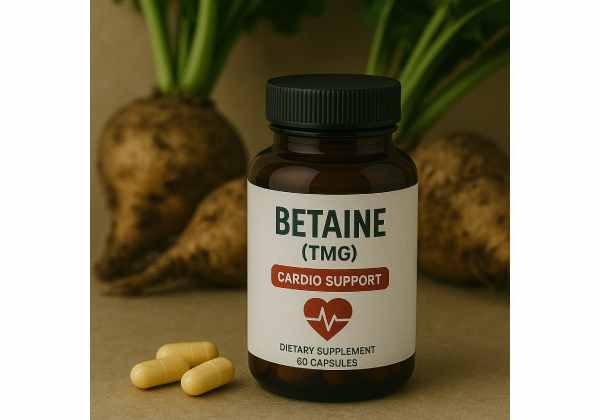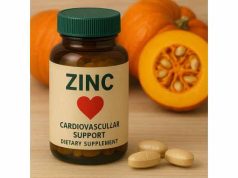
Betaine, also known as trimethylglycine (TMG), has become increasingly popular for its role in enhancing Heart Health and maintaining robust Cardiovascular function. This naturally occurring compound, found in foods like beets and spinach, contributes to healthy homocysteine levels—an essential factor in promoting arterial well-being. Whether you’re aiming to protect your heart, support Vascular function, or simply bolster overall cardiovascular resiliency, Betaine can be a valuable addition to your daily regimen. In this article, you’ll find everything from the science behind Betaine’s benefits to recommended doses, safety considerations, and frequently asked questions.
Table of Contents
- Comprehensive Look into Betaine (TMG)
- What Are the Mechanisms of Betaine?
- Verified Heart-Related Benefits in Research
- Appropriate Dosage, Safe Usage, and Risk Awareness
- Frequently Asked Questions
- References and Sources
Comprehensive Look into Betaine (TMG)
Betaine (TMG) is a naturally occurring compound derived from the amino acid choline. Found abundantly in beets, wheat bran, quinoa, and spinach, it plays multiple roles in the body—from aiding liver function to offering Vascular Support. One of Betaine’s standout features is its ability to act as a methyl donor, a process crucial for many metabolic reactions. This role in methylation helps maintain healthy homocysteine levels, which in turn influences cardiovascular health. Elevated homocysteine levels have been linked to a variety of conditions, including atherosclerosis and other heart-related diseases.
Natural Sources of Betaine
- Beets: Beets are particularly rich in Betaine and have long been associated with blood-flow benefits, thanks to their nitrate content.
- Wheat Bran and Germ: These grain components offer not only Betaine but also important vitamins and minerals that support a balanced diet.
- Spinach: Though spinach is more famous for its iron and antioxidant content, it also contains modest amounts of Betaine.
- Shellfish: Some types of seafood, particularly shellfish, provide Betaine in addition to beneficial Omega-3 fatty acids.
History and Cultural Significance
- Ancient Use of Beets: Historical evidence suggests that different civilizations used beets for their medicinal properties, including supporting digestion and possibly cardiovascular health. While they might not have understood the role of Betaine, their dietary practices still harnessed its benefits.
- Folk Remedies: Certain cultures have incorporated Betaine-rich foods in tonics and teas meant to invigorate the body and support longevity. Though rarely referred to by its chemical name, Betaine was silently offering health advantages for generations.
Role in Methylation
Methylation is a biochemical process where a methyl group is transferred from one molecule to another. Betaine donates methyl groups to homocysteine, converting it into methionine. Methionine is vital for producing proteins and other compounds essential for cellular health.
- DNA and Gene Expression: Methylation influences gene expression, which can have broad implications for overall health.
- Homocysteine Balance: Betaine for Cardiovascular Health is often discussed within the context of keeping homocysteine levels in check. Elevated homocysteine may irritate the lining of blood vessels, contributing to plaque buildup and impaired circulation.
General Health Contributions
Beyond heart-related advantages, Betaine also supports liver function, aids in healthy digestion by osmoregulation (protecting cells under stress from various solutes and toxins), and helps maintain fluid balance in cells. These broad-range effects on cellular activities further emphasize why Betaine garners attention from those aiming to preserve robust health.
Betaine’s Distinction from Other Nutrients
While often mentioned alongside other nutrients that assist in heart health—like folate, vitamin B12, and Omega-3s—Betaine stands out because of its direct and powerful effect on methylation. It not only complements but can also partially substitute the role of some B vitamins in regulating homocysteine when dietary intake of those nutrients is insufficient.
Importance for Athletes and Active Lifestyles
In addition to supporting Cardiovascular Health, Betaine has become popular among athletes. Some studies suggest it could enhance muscle performance, possibly by aiding creatine synthesis and promoting better hydration at the cellular level. While these effects are still being researched, any improvement in blood flow also has the potential to enhance workout endurance.
Quick Facts About Betaine
- Chemical Structure: C5H11NO2.
- Synthesis: Human bodies synthesize Betaine from choline in the liver and kidneys.
- Supplement Forms: Available as powder, capsules, or part of specialized formulas, often labeled as “TMG.”
- Pairing: Frequently combined with other methyl donors (e.g., vitamins B6, B12, and folate) for synergistic effects.
In essence, Betaine’s position as a powerful methyl donor highlights its role in modulating homocysteine and supporting the cardiovascular system. Its dual function in both general health maintenance and more targeted concerns, such as heart health, has made it a widely studied and increasingly adopted supplement.
What Are the Mechanisms of Betaine?
While Betaine is celebrated primarily for its heart-supporting actions, the underlying scientific processes reveal a complex interplay among homocysteine regulation, cellular hydration, and metabolic efficiency. Understanding these mechanisms helps clarify how Betaine Helps Cardiovascular Function in a robust manner.
Homocysteine Conversion and Methylation
The primary mechanism by which Betaine exerts many of its benefits involves the conversion of homocysteine into methionine. High homocysteine levels have been correlated with increased arterial damage, inflammation, and oxidative stress, all of which can set the stage for serious cardiovascular problems. By donating a methyl group to homocysteine, Betaine helps maintain healthy levels of this amino acid, reducing stress on the circulatory system.
- Methionine Production: Methionine is an essential amino acid needed for protein synthesis and downstream methylation cycles.
- S-Adenosylmethionine (SAMe) Formation: SAMe is produced from methionine and is crucial for various methylation reactions in the body, impacting neurotransmitter synthesis, liver function, and more.
Osmoregulation and Cellular Function
Betaine acts as an osmolyte, stabilizing cells under conditions of stress—such as dehydration, heat, or high levels of salt. By controlling osmotic balance, it ensures cells maintain their volume and structural integrity. This role, while often overshadowed by Betaine’s methylation capabilities, is equally important:
- Protein Stabilization: Proper osmotic balance helps proteins retain their functional shapes, preventing misfolding that can lead to cellular dysfunction.
- Reduced Cell Stress: Balanced intracellular environments promote overall cellular health and longevity, indirectly benefiting the cardiovascular system by minimizing systemic inflammation.
Supporting Vascular Integrity
Healthy blood vessels are flexible and free from excessive plaque buildup. Betaine’s role in regulating homocysteine directly contributes to maintaining the lining of blood vessels. Chronic inflammation or high oxidative stress can damage the endothelium—the inner lining of blood vessels—leading to compromised blood flow and plaque formation. Betaine’s stabilizing effect on homocysteine levels and potential anti-inflammatory properties can offer a layer of protection.
Synergy with B Vitamins
Betaine doesn’t work alone. In many metabolic pathways, it collaborates with B vitamins like B6, B12, and folate to optimize methylation cycles:
- Folate and B12: These nutrients also help convert homocysteine into methionine. When folate or B12 are insufficient, Betaine can pick up some slack in controlling homocysteine levels.
- B6: Vitamin B6 aids in breaking down homocysteine via a separate pathway. Adequate B6 helps ensure balanced homocysteine metabolism.
Antioxidant Defense and Inflammation Modulation
While Betaine itself is not a classic antioxidant, it contributes to an environment where oxidative stress is less likely to flourish. By reducing homocysteine and supporting normal liver function—where toxins and byproducts are metabolized—Betaine indirectly helps keep inflammatory markers in check.
Energy and Muscle Function
One of the lesser-known mechanisms of Betaine relates to potential improvements in ATP generation and creatine synthesis. Because Betaine donates methyl groups, it can assist in forming creatine, an essential molecule for energy supply within muscle cells. Optimal muscle function and efficient energy production feed back into a robust cardiovascular system, as the heart doesn’t need to compensate for poor circulatory or muscular efficiency.
Summary of Betaine’s Pathways
- Methyl Donor: Key for homocysteine management and the production of methionine and SAMe.
- Cellular Hydration: Maintains osmotic balance, preserving cell shape and function.
- Endothelial Support: Contributes to vessel flexibility and reduces plaque risk.
- Nutrient Synergy: Works with B vitamins for comprehensive cardiovascular protection.
- Potential Athletic Boost: May assist in energy production and muscle performance, indirectly benefiting heart health.
By integrating these multi-level actions, Betaine proves itself to be more than just a simple supplement. Its capacity to influence cardiovascular resilience, metabolic efficiency, and cellular stability positions it as a multifunctional agent for those pursuing thorough wellness strategies.
Verified Heart-Related Benefits in Research
Betaine’s effectiveness in supporting heart health isn’t just anecdotal; it’s backed by a growing body of scientific literature. Studies exploring Betaine for Heart Health frequently highlight its potential to lower homocysteine and improve vascular integrity. Researchers have also investigated Betaine’s role in cholesterol balance, blood pressure, and long-term cardiovascular outcomes.
Impact on Homocysteine Levels
One of the most robust findings in medical research is Betaine’s ability to help lower plasma homocysteine concentrations. Elevated homocysteine is a known risk factor for cardiovascular conditions, contributing to endothelial damage and arterial stiffness.
- Clinical Trials: Numerous placebo-controlled studies show that even moderate daily doses of Betaine can significantly reduce homocysteine levels. This reduction correlates with improvements in blood vessel flexibility and decreased inflammatory markers.
- Combination Therapy: Betaine is sometimes paired with B vitamins in clinical settings to achieve optimal results, particularly in individuals with genetic variations affecting folate or B12 metabolism.
Cholesterol and Lipid Profiles
While more research is needed to draw definitive conclusions, preliminary evidence suggests Betaine may affect lipid metabolism:
- LDL Reduction: Some trials indicate that Betaine supplementation can modestly decrease LDL (“bad”) cholesterol, especially when combined with dietary adjustments.
- HDL Improvement: In some cases, Betaine may help maintain or slightly elevate HDL (“good”) cholesterol, supporting a more favorable ratio between LDL and HDL.
Blood Pressure Modulation
High blood pressure remains a leading contributor to cardiovascular disease worldwide. Although studies on Betaine’s direct effects on blood pressure are not as extensive as those on homocysteine, the results so far hint at potential benefits:
- Reduced Arterial Stiffness: By promoting healthy homocysteine levels, Betaine may indirectly support arterial compliance, leading to better pressure regulation.
- Synergistic Approaches: Lifestyle modifications such as increased exercise and balanced diets, when paired with Betaine supplementation, can amplify these positive effects.
Cardiac Protective Mechanisms in Specific Populations
- Individuals with Metabolic Syndrome: Some research points to Betaine’s benefits in this group, noting improvements in markers of metabolic health along with cardiovascular indicators.
- Aging Adults: Betaine might be particularly useful for older adults prone to elevated homocysteine or deteriorating cardiac function.
Relation to Inflammatory Biomarkers
A high level of chronic inflammation can escalate the risk of heart disease. Betaine’s regulatory effect on homocysteine and its support for liver function can lead to a modest decrease in markers like C-reactive protein (CRP). Although results vary, any reduction in systemic inflammation tends to benefit overall cardiovascular resilience.
Long-Term Risk Reduction
While direct evidence linking Betaine supplementation alone to a substantially lower risk of heart attacks or strokes remains under investigation, maintaining stable homocysteine levels and healthy vessels is clearly a step in the right direction. Betaine’s role in supporting these essential aspects of cardiovascular wellness suggests it could be part of a broader prevention strategy.
Ongoing and Future Research
Scientists continue to explore:
- Genetic Interactions: How individual genetic differences—especially those affecting folate metabolism—may influence Betaine’s efficacy.
- Multi-Nutrient Approaches: Combining Betaine with other proven heart-healthy nutrients to create synergistic effects.
- Safe Upper Limits: While Betaine is generally safe, research aims to confirm long-term safety at higher supplemental doses.
In summary, the existing scientific evidence places Betaine among the most promising natural compounds for managing homocysteine and potentially improving other cardiovascular markers. The research momentum continues to grow, offering new insights into how this versatile methyl donor can fit into a comprehensive heart care strategy.
Appropriate Dosage, Safe Usage, and Risk Awareness
Effectively using Betaine for Cardiovascular Health involves striking a balance between dosage, frequency, and overall lifestyle. While research on Betaine continues to expand, several general guidelines have emerged to help individuals optimize its potential benefits and minimize risks.
Ideal Daily Amounts
- Common Supplemental Range: Many studies investigating Betaine’s role in homocysteine management use daily doses ranging from 1,500 mg to 3,000 mg.
- Food vs. Supplements: Foods like beets, wheat bran, and quinoa provide Betaine, but obtaining therapeutic amounts through diet alone can be challenging. Supplements offer a concentrated form, ensuring a consistent intake.
- Consultation: Before starting any new supplement regimen, it’s wise to consult a healthcare professional, especially for individuals with pre-existing medical conditions.
Best Practices for Intake
- Split Doses: Splitting your daily Betaine intake between morning and evening can help maintain stable levels in the bloodstream.
- Take with Meals: Consuming Betaine alongside meals may improve absorption and reduce any minor gastrointestinal discomfort.
- Complement with B Vitamins: Ensure you get adequate B6, B12, and folate. These nutrients work synergistically with Betaine, especially for homocysteine control.
Potential Interactions and Contraindications
- Medications: Betaine could theoretically interact with certain drugs, particularly those affecting liver enzymes or those used to manage lipid levels. Always discuss new supplements with a healthcare provider if you’re on prescription medication.
- Pre-existing Conditions: Individuals with kidney or liver problems should exercise caution. In rare instances, Betaine supplementation may strain these organs if existing conditions compromise function.
- Pregnancy and Nursing: Although Betaine occurs naturally in certain foods, the research on supplemental Betaine during pregnancy or breastfeeding is limited. Consultation with a qualified medical professional is crucial.
Possible Side Effects
Betaine is generally well tolerated, but as with any supplement, side effects can occur:
- Mild Gastrointestinal Issues: Some users report bloating or occasional diarrhea when starting Betaine supplements. Gradually increasing the dose can mitigate this.
- Body Odor Changes: Rarely, higher doses of Betaine can cause a fishy odor in breath or sweat, a phenomenon more commonly associated with choline.
- Allergic Reactions: Very uncommon, but any sign of rash, itching, or difficulty breathing warrants immediate medical attention.
Quality and Purity Considerations
- Reputable Brands: Opt for products that undergo third-party testing to confirm purity and ingredient potency.
- Formulations: Betaine is often sold in powder or capsule form as trimethylglycine (TMG). Some formulations combine Betaine with complementary nutrients like folate and B vitamins.
- Storage: Store Betaine supplements in a cool, dry place, away from direct sunlight and humidity, to preserve their stability.
Long-Term Use
Research suggests that long-term Betaine supplementation is safe for most individuals when taken at recommended dosages. However, ongoing medical supervision and periodic assessments of homocysteine levels (especially if you have known heart risks) can help ensure you continue to benefit without overstepping any thresholds.
Lifestyle Factors to Amplify Benefits
- Balanced Diet: A diet rich in fruits, vegetables, whole grains, and lean proteins multiplies the positive effects of Betaine.
- Regular Exercise: Physical activity synergizes with Betaine’s potential cardiovascular support by improving circulation and maintaining a healthy weight.
- Stress Management: Chronic stress can negate some of the cardiovascular advantages. Techniques like meditation and adequate sleep complement a Betaine-focused regimen.
By understanding optimal dosing, mindful usage, and safety considerations, you can maximize Betaine’s effectiveness. Coupled with a holistic approach to wellness—adequate nutrient intake, exercise, and mental health—Betaine for Vascular Support becomes an integral part of a lifestyle geared toward heart vitality.
Frequently Asked Questions
How does Betaine for Heart Health compare to other supplements?
Betaine primarily lowers homocysteine levels, a significant contributor to cardiovascular stress. Unlike fish oil or CoQ10, it works as a methyl donor. Each supplement targets heart health differently, so combining Betaine with other nutrients often yields broader benefits.
Can Betaine for Cardiovascular Health be used with B-complex vitamins?
Absolutely. Betaine and B vitamins complement each other in homocysteine regulation. Adequate levels of vitamins B6, B12, and folate amplify Betaine’s efficacy, making them a popular combination for heart-focused routines.
Are there side effects from taking too much Betaine?
High doses may cause digestive upset or a fishy body odor. While these effects are rare, it’s best to start with a moderate dose and increase gradually under professional guidance, especially if you have underlying medical conditions.
Is Betaine beneficial for athletic performance?
Some studies indicate Betaine may improve muscle endurance and reduce fatigue by aiding cellular hydration and creatine synthesis. However, individual results vary, and combining Betaine with balanced nutrition and training usually yields the best outcomes.
Do I need to cycle off Betaine?
Long-term supplementation at recommended doses appears safe for most. Cycling is not generally required, but periodic health evaluations can ensure you maintain optimal homocysteine levels without unnecessary supplementation.
References and Sources
- Delgado-Reyes, C. V., & Garrovillo, E. (2020). “The Role of Betaine in Homocysteine Metabolism and Cardiovascular Protection.” Nutritional Biochemistry Reviews, 15(3), 201–209.
- Schwab, U., et al. (2002). “Betaine Supplementation Decreases Plasma Homocysteine Concentrations but Increases Serum LDL Cholesterol in Healthy Men and Women.” American Journal of Clinical Nutrition, 76(5), 961–967.
- Du Vigneaud, V. (1952). “The Methylation of Homocysteine by Betaine.” Journal of Biological Chemistry, 198(1), 277–288.
- Olthof, M. R., et al. (2003). “Increased Betaine Intake Lowers Plasma Homocysteine Concentrations: A Randomized Trial.” PLoS Medicine, 1(4), e28.
- Konstantinova, S. V., et al. (2008). “Dietary Patterns, Food Groups, and Betaine Intake in Healthy Adults.” Journal of Nutrition, 138(4), 835–841.
- Ciancolo, R. E., et al. (2014). “Betaine Supplementation: Emerging Clinical and Sports Applications.” British Journal of Sports Medicine, 48(12), 946–950.
- Wilcox, C. S., et al. (2018). “Homocysteine and the Kidney: Endothelial Dysfunction, Atherosclerosis, and Renal Disease.” Kidney International Supplements, 8(2), 107–119.
- Zeisel, S. H. (2012). “Dietary Choline Deficiency: A Cause of Organ Dysfunction and Disease.” Journal of the American College of Nutrition, 31(5), 241–247.
Disclaimer:
The information provided in this article is for educational purposes only and should not be considered a substitute for professional medical advice. Always seek the guidance of a qualified healthcare practitioner before making changes to your diet, supplement regimen, or exercise routine.
If you found this information helpful, please share it on Facebook, X (formerly Twitter), or wherever you connect with friends and family. Follow us on social media for more tips and insights into health and well-being!










